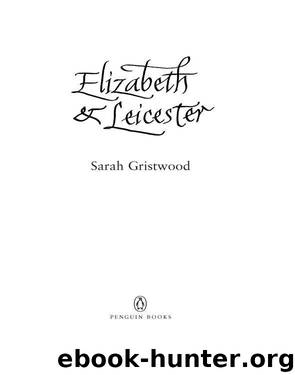Elizabeth and Leicester by Sarah Gristwood

Author:Sarah Gristwood
Language: eng
Format: epub
Publisher: Penguin Publishing Group
Published: 2010-03-01T05:00:00+00:00
12
‘Our estate requireth a match’ 1570-1572
FOR ELIZABETH TOO, THE NEW DECADE OPENED ONTO THE FAINT rumours of change. One way or another, the possibility of the Queen’s linking herself to a Valois prince was to occupy much of the 1570s, though the full impact of the latest set of proposals - the moment when the purely political turned to the personal, when the fantasy of marriage nearly became reality - would not come until almost the end of that decade.
But already, in 1570, there was clear and pressing need for England to find allies, and France (ancient enemy though it might be) was the obvious ally against the ever-growing might of Spain; a might that threatened to upset the precarious balance of power in Europe. At home, too, Elizabeth was feeling vulnerable. In February 1570 Pope Pius V issued the bull Regnans in excelsis, depriving Elizabeth, in the eyes of all loyal Catholics, of ‘her pretended right to her realm’. The fact of the Queen of Scots’ presence in her country put her under ever more pressure to marry. And so the year that first saw Elizabeth’s Accession Day celebrated as a public holiday - that first saw the worship of the Virgin Queen, you might say - saw also the start of the long negotiations with the French royal house of Valois; negotiations that did at last come close to ending her virginity.
In the September of 1570 the French sent a proposal that Elizabeth should marry the Duke of Anjou, brother to the French king Charles IX. Henri was nineteen to Elizabeth’s almost forty; but the age gap that had worried Elizabeth so much when negotiating for Charles seemed not to concern her this time. But then, it is possible that the alliance was theoretical on both sides, anyway. Anjou was certainly reluctant. His fervent personal Catholicism was bound to prove a major problem; so indeed was his promiscuous bisexuality.44
Perhaps the conspicuous complications explain why Leicester himself sounded a note of cautious optimism about the potential match. On a personal level, he must have known Elizabeth’s heart was never likely to be engaged; on a political one, he had learnt the usefulness of a marriage negotiation from his royal mistress. As he wrote to his ally Francis Walsingham, then serving as ambassador to the French court: ‘I concede our estate requireth a match, but God send us a good one and meet for all parties.’ (An exile for his faith during Mary Tudor’s reign, Walsingham would become ever more important in the years ahead. The man who became the organizing genius behind Elizabeth’s network of spies and informers - ‘a most subtle searcher of secrets’, as Camden said - would also be bound to Leicester and his family by a number of ideological and personal ties.)
For their part, the French - as Walsingham wrote in response - were understandably sceptical about England’s apparent welcome of their approach. ‘They think here you do but dally,’ Walsingham explained to the Queen, and Leicester must have understood their feeling precisely.
Download
This site does not store any files on its server. We only index and link to content provided by other sites. Please contact the content providers to delete copyright contents if any and email us, we'll remove relevant links or contents immediately.
Fanny Burney by Claire Harman(26592)
Empire of the Sikhs by Patwant Singh(23069)
Out of India by Michael Foss(16846)
Leonardo da Vinci by Walter Isaacson(13315)
Small Great Things by Jodi Picoult(7115)
The Six Wives Of Henry VIII (WOMEN IN HISTORY) by Fraser Antonia(5496)
The Wind in My Hair by Masih Alinejad(5085)
A Higher Loyalty: Truth, Lies, and Leadership by James Comey(4947)
The Crown by Robert Lacey(4805)
The Lonely City by Olivia Laing(4796)
Millionaire: The Philanderer, Gambler, and Duelist Who Invented Modern Finance by Janet Gleeson(4462)
The Iron Duke by The Iron Duke(4349)
Papillon (English) by Henri Charrière(4256)
Sticky Fingers by Joe Hagan(4188)
Joan of Arc by Mary Gordon(4098)
Alive: The Story of the Andes Survivors by Piers Paul Read(4017)
Stalin by Stephen Kotkin(3956)
Aleister Crowley: The Biography by Tobias Churton(3628)
Ants Among Elephants by Sujatha Gidla(3459)
